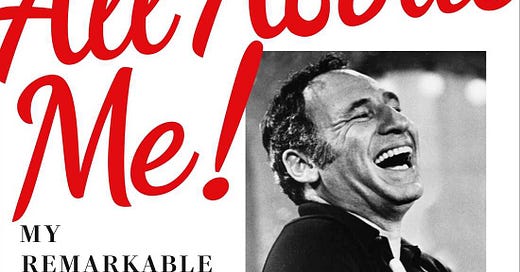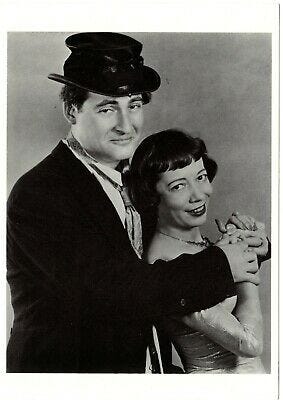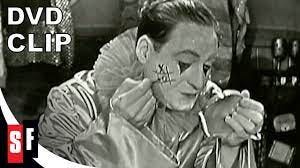This gem of wisdom came from Sid Caesar’s big brother, David.
Even though Sid had a great career as a comedian, he complained that
he would rather be an executive and not have to work so hard. What his
brother told him- and I believe these were his exact words, “Sid,
Funny is money. Exec is dreck.” Dreck being Yiddish for “crap,”.
We should all be grateful that the wisdom of brother David prevailed.
Sid was the star of “YOUR SHOW OF SHOWS” on NBC, a weekly
90-minute mix of sketches, movie takeoffs and musical acts- LIVE- and
its 60-minute successor on CBS, “CAESAR’S HOUR”,- also LIVE.
It was like a high wire act without a net.
Carl Reiner, who was a mainstay of the shows, used to tell of
explaining to a group of young show biz aspirants that the shows went
on the air LIVE. One of the students asked, “How long did they take to
edit?” Though “SATURDAY NIGHT LIVE” is also live on the air, its
mix of short bits is nowhere as challenging as the sustained sketches Sid
and company would do.
Sid was to television as Chaplin was to film.. The other comedy
stars when television started were already famous in radio or movies: Ed
Wynn, Eddie Cantor Jimmy Durante, Jack Benny, Red Skelton, Milton
Berle, Martin & Lewis. Sid was totally a creation of television.
Sid, who was larger than life, emotional and volatile, was paired with
prim, petite and proper Imogene Coca. They were Beauty and The
Beast.
Rounding out the fantastic cast were Carl Reiner and Howard
Morris. The writers on the shows were an All-Star Team, who went on
to brilliant careers, among them: Neil Simon, the most successful
comedy playwright in the history of American Theatre; Larry Gelbart,
who wrote “TOOTSIE” and produced and wrote most of the TV series
“MASH”; Joe Stein, who wrote the book for “FIDDLER ON THE
ROOF”; Michael Stewart, who wrote the book for “HELLO, DOLLY!”;
and Woody Allen. Each series had a woman writer on staff-- Lucille
Kallen and Selma Diamond—long before the women’s movement won
their place in The Writers Room.
The comedy was above anything on television then or since. I once
worked on a project with an L.A. chef, who told me, a restaurant is only
as good as its clientele. The same applies to Entertainment.
In the early days, TV was only seen in the big cities. Sid did take-
offs on movies the rest of America hadn’t even seen. The first
great Japanese samurai hit was “UGETSU”. The show did a parody
they called “UBETCHU”. Sid played The Great Prince Mishigas
(To Come: “Yiddish As A Second Language.”) Sid serenaded
his beloved in doubletalk Japanese while playing the samisen. Carl, his
jealous rival, snarled, “Aaaaagh! I breaka you banjo!”
The take-offs were smart and authentic. The audience in those big
cities were hip to what the show was doing. Fast forward 25 years and
John Belushi’s samurai sketches on “SATURDAY NIGHT LIVE”.
Belushi did a very broad, physical slop sketch for an audience
who didn’t know a samurai from a samovar,.
From the time he was a child, Sid was fluent in all of the world’s
languages, although what he said so convincingly was just meaningless
doubletalk. His German Professor with his battered top hat was a classic,
interviewed by Carl Reiner, a precursor of the interviews with “The
2,000-Year-OId Man.”
When the show did a take-off of ‘RIGOLETTO”, Sid played
Pagliacci, singing an aria in doubletalk Italian as he applied
make-up, playing tic-tac-toe on his cheek. How brilliant was that!
So now, turn back the clock and let me tell you how my great
agent, George Shapiro got me a job writing for Sid Caesar:
I was sitting with George in his office at The William Morris
Office when someone walked by in the hall. George sprang to his feet
and darted out of the room. He returned a few minutes later with the man
who was going to produce 9 half-hour Specials for the ABC network
called “AS CAESAR SEES IT.” Right then and there, I was hired.
The show was done in New York in an old rundown theatre,
repurposed for taping TV. To navigate between the stage and the
dreary little dressing rooms required navigating a thousand steps.
Sid’s dressing room was so small he could lie on his makeshift bed and
grip the plumbing of the sink above his head. . One night, after a taping,
Sid was complaining about working with a cast member who was totally
without talent. It depressed him so, he gripped the pipe of the wash basin
next to his head--– I thought he would rip it out of the wall—and
groaned, “It’s untorrented!” None of us knew what he meant and we
didn’t dare ask.
Sid was impulsive. There was a direct connection between his
feelings and his body; his mind never interfered. One day I gave him a
note about a line reading. I walked up to him and said, “You’ve got to do
that line this way.” Sid towered over me. He grabbed me by the ears and
growled, “I don’t gotta do nuttin’”. There was a cigar in his mouth
which he ground into my forehead. Luckily it was not lit, but I spent the
rest of the day looking like it was Ash Wednesday.
The demands of his first two Live series had driven Sid to become
addicted to drugs and alcohol. By the time we did our series he was no
longer in his prime. He was like a great athlete who had lost his timing
and condition.
In the days before videotape, programs were recorded off the air on
kinescope. On the rare occasion when Sid redid a favorite sketch he had
done before, he would sit alone in the rehearsal hall watching a
kinescope of the sketch. It struck me he was like an aging Champion,
studying how he used to win fights.
Sid went on to have a long career, starring on Broadway in the
musical, “LITTLE ME” as well as movies like “IT’S A MAD,
MAD, MAD WORLD” and, of course, every comedy-variety
show wanted him as a guest. I loved him and respected him. He was a
Champion!
Now, let us pause for a little Theatrical Trivia: The writing staff of
our series, “AS CAESAR SEES IT”, consisted of myself and Terry
Ryan and the Head Writer, Mel Brooks. Mel, as you might imagine, was
a study in perpetual motion. He used to say he should not have a writing
credit; his credit should read, “Yelling and screaming in a room by Mel
Brooks.”
This was the time when film and TV stars worked the summer
circuit, appearing in plays in local theatres across the country.
One of the most popular was Edward Everett Horton, who
usually played a foolish, bumbling rich guy in films with Fred Astaire
and others. Horton went out every summer for years in a play called
“SPRINGTIME FOR HENRY”. Brooks often said he was going to
write a play called, “SPRINGTIME FOR HITLER”. Hmmm!
Wonder whatever became of that notion.
Before moving on to Danny Kaye, a few parting words about my
Agent, George Shapiro. At William Morris, George worked with
Howard West. They had been close friends since they grew up together
in The Bronx. Eventually, George and Howie left the office to form
their own Management Company. One of their clients was a young
up and coming comic named Jerry Seinfeld. They got Jerry a series with
Rob Reiner’s production company, Castle Rock. It went on the air as a
summer replacement. The ratings were not impressive so the network
wanted to end it. George and Howie got them to give the show one more
try. “SEINFELD” became a humongous hit and made Jerry arguably the
premiere comic of his generation.
Howard West has passed away, but George continues to be very
involved with Jerry’s career. He also produces as well. He is everything
an agent should be, And a lifelong friend.
NEXT: DANNY KAYE
CATCHING UP: READ THE POSTS YOU HAVE MISSED
When you subscribe, you start receiving the latest post. This is Episode 12. To read all the Posts you may have missed, go to
https://ercham.substack.com/archive







